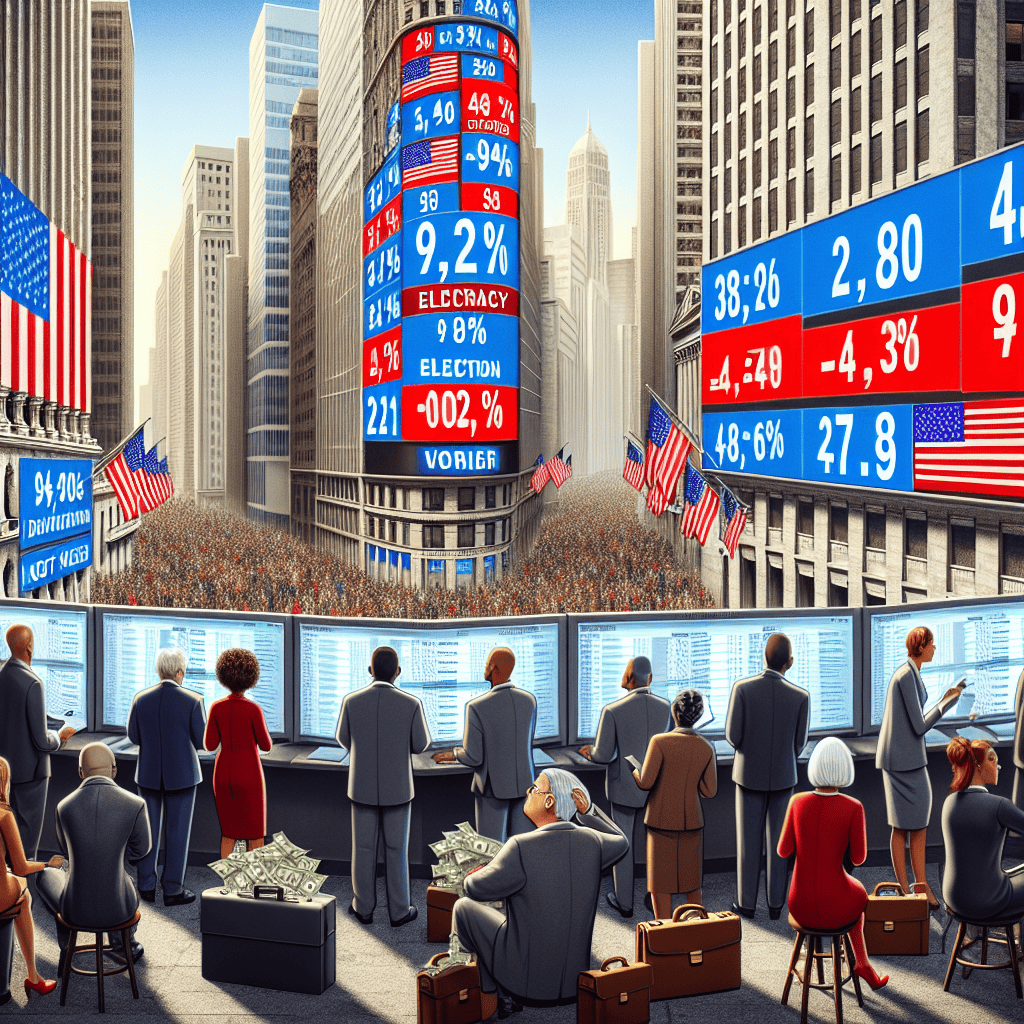“Votes Over Dollars: Wall Street’s New Election Equation”
Introduction
Wall Street’s attention is increasingly drawn to the outcomes of elections rather than the financial contributions made during the campaign process. This shift underscores a growing recognition of the profound impact that political decisions and policy changes can have on financial markets and economic conditions. Investors and financial analysts are keenly aware that the results of elections can lead to significant shifts in regulatory environments, tax policies, and government spending priorities, all of which can influence market dynamics and investment strategies. As a result, Wall Street’s focus is on understanding and anticipating the potential implications of electoral outcomes, rather than merely tracking the flow of campaign donations. This strategic emphasis highlights the importance of political analysis in financial decision-making and the need for investors to stay informed about the political landscape to navigate the complexities of the market effectively.
Impact Of Election Outcomes On Wall Street Performance
As the political landscape in the United States continues to evolve, Wall Street remains acutely attuned to the outcomes of elections rather than the financial contributions that often precede them. This focus underscores the profound impact that political shifts can have on market performance, as investors and financial analysts strive to anticipate the economic policies that will shape the future. While campaign contributions from Wall Street to political candidates are significant, they are often seen as a means to an end, with the ultimate goal being to influence policy outcomes that align with market interests.
The relationship between election outcomes and Wall Street performance is complex and multifaceted. Historically, markets have shown varying degrees of sensitivity to changes in political power, with different sectors responding uniquely to the policies of incoming administrations. For instance, a government perceived as business-friendly may lead to a surge in stock prices, particularly in industries such as finance, energy, and healthcare. Conversely, an administration that prioritizes regulatory reforms and increased taxation may cause apprehension among investors, leading to market volatility.
Moreover, the anticipation of election results often leads to heightened market activity, as investors attempt to position themselves advantageously. This pre-election period is characterized by increased trading volumes and fluctuating stock prices, reflecting the uncertainty and speculation that accompany political transitions. In this context, Wall Street’s focus is not merely on the immediate aftermath of an election but also on the long-term implications of policy changes that may arise from a new administration.
In addition to domestic elections, Wall Street also closely monitors international political developments, recognizing that global events can have significant repercussions on the U.S. economy. Trade policies, diplomatic relations, and geopolitical tensions are all factors that can influence market performance. For example, an election outcome that signals a shift towards protectionism may lead to concerns about trade disruptions, affecting industries reliant on global supply chains. Conversely, a commitment to international cooperation and free trade can bolster investor confidence, leading to positive market reactions.
Furthermore, the role of central banks and monetary policy cannot be overlooked when considering the impact of election outcomes on Wall Street. The Federal Reserve, in particular, plays a crucial role in shaping economic conditions through its interest rate decisions and monetary policy stance. Elections that result in significant changes to the composition of the Federal Reserve Board or its leadership can lead to shifts in monetary policy, with direct consequences for financial markets. Investors closely watch these developments, as changes in interest rates can affect borrowing costs, consumer spending, and overall economic growth.
In conclusion, while financial contributions from Wall Street to political campaigns are a notable aspect of the electoral process, it is the outcomes of these elections that hold the greatest significance for market performance. The intricate interplay between political developments and economic policies underscores the importance of understanding the broader implications of election results. As Wall Street continues to navigate the complexities of the political landscape, its focus remains firmly on the potential for policy changes that can shape the economic environment and influence market dynamics. Through careful analysis and strategic positioning, investors seek to mitigate risks and capitalize on opportunities presented by the ever-evolving political climate.
Historical Analysis: Wall Street’s Reaction To Election Results
In the intricate dance of politics and finance, Wall Street has long been a keen observer of election outcomes, with its reactions often serving as a barometer for economic expectations. Historically, the financial sector’s response to election results has been more pronounced than its reaction to campaign contributions, underscoring the importance of policy over monetary influence. This focus on election outcomes rather than financial contributions highlights a pragmatic approach, where the implications of policy shifts take precedence over the transient nature of campaign financing.
To understand this dynamic, it is essential to consider the historical context in which Wall Street operates. Elections, particularly presidential ones, have the potential to usher in significant policy changes that can affect regulatory environments, tax structures, and international trade agreements. These factors, in turn, have direct implications for market stability and growth prospects. For instance, the election of a candidate with a platform favoring deregulation can lead to bullish market behavior, as investors anticipate a more business-friendly environment. Conversely, the election of a candidate advocating for increased regulation may result in market trepidation, as businesses brace for potential operational constraints.
Moreover, Wall Street’s focus on election outcomes is not merely a reactionary stance but a strategic one. Financial markets thrive on predictability and stability, and the clarity provided by election results allows investors to recalibrate their strategies in alignment with anticipated policy directions. This is particularly evident in sectors that are heavily influenced by government policy, such as healthcare, energy, and finance. For example, the election of a government committed to renewable energy initiatives can lead to a surge in investments in green technologies, while a government favoring fossil fuels might bolster traditional energy stocks.
In contrast, while financial contributions to political campaigns are significant, they do not wield the same immediate influence on market behavior. Contributions are often seen as a means to gain access or favor, but they do not guarantee policy outcomes. The complex web of political negotiations and legislative processes means that the impact of financial contributions is often diluted by the time policies are enacted. Consequently, Wall Street tends to prioritize the tangible outcomes of elections over the speculative influence of campaign financing.
Furthermore, the global nature of financial markets necessitates a broader perspective. Election outcomes in major economies can have ripple effects across the world, influencing global trade dynamics and capital flows. Wall Street, with its interconnectedness to international markets, must therefore consider not only domestic election results but also those in key trading partners. This global outlook reinforces the emphasis on election outcomes, as they provide critical insights into future economic landscapes.
In conclusion, Wall Street’s historical focus on election outcomes rather than financial contributions reflects a strategic prioritization of policy implications over monetary influence. By concentrating on the tangible effects of electoral results, the financial sector can better navigate the complexities of market dynamics and position itself advantageously in an ever-evolving economic environment. This approach underscores the importance of elections as pivotal events that shape the trajectory of financial markets, highlighting the intricate interplay between politics and finance.
Key Election Issues That Influence Wall Street Trends
As the political landscape in the United States continues to evolve, Wall Street remains acutely attuned to the outcomes of elections rather than the financial contributions that often accompany them. This focus is driven by the understanding that election results can significantly influence economic policies, regulatory frameworks, and market dynamics. Consequently, investors and financial analysts closely monitor key election issues that have the potential to sway market trends and impact investment strategies.
One of the primary concerns for Wall Street is the regulatory environment that emerges following an election. Different political parties and candidates often have divergent views on regulation, particularly in sectors such as finance, healthcare, and energy. For instance, a government inclined towards deregulation may be perceived as favorable by investors, as it could lead to reduced compliance costs and increased profitability for businesses. Conversely, a more regulatory-focused administration might introduce policies that could constrain certain industries, thereby affecting their market performance. Thus, the regulatory stance of elected officials becomes a critical factor in shaping Wall Street’s expectations and strategies.
In addition to regulatory considerations, fiscal policy is another pivotal issue that captures Wall Street’s attention during election cycles. The approach to taxation, government spending, and budget deficits can have profound implications for economic growth and market stability. For example, a government that prioritizes tax cuts and increased public spending might stimulate economic activity in the short term, potentially boosting corporate earnings and stock prices. However, concerns about long-term fiscal sustainability and inflationary pressures could temper investor enthusiasm. Therefore, Wall Street carefully evaluates the fiscal policy proposals of candidates to gauge their potential impact on the broader economy and financial markets.
Moreover, trade policy is a significant election issue that influences Wall Street trends. In an increasingly interconnected global economy, the stance of elected officials on trade agreements, tariffs, and international relations can affect the profitability of multinational corporations and the competitiveness of domestic industries. A protectionist trade policy might lead to increased costs for companies reliant on global supply chains, while a more open trade approach could enhance market access and growth opportunities. Consequently, Wall Street pays close attention to the trade policy positions of candidates, as these can have far-reaching effects on market sentiment and investment decisions.
Furthermore, Wall Street is also sensitive to the broader economic policies that candidates propose, particularly those related to infrastructure, technology, and innovation. Investments in infrastructure development can stimulate economic growth and create opportunities for companies in construction, transportation, and related sectors. Similarly, policies that support technological advancement and innovation can drive growth in emerging industries, such as renewable energy and digital services. As a result, Wall Street evaluates the potential economic impact of these policies to identify sectors that may benefit from increased government support and investment.
In conclusion, while financial contributions to political campaigns are often highlighted in media coverage, Wall Street’s primary focus remains on the outcomes of elections and the key issues that influence market trends. By closely analyzing regulatory, fiscal, trade, and economic policies proposed by candidates, investors and financial analysts aim to anticipate changes in the economic landscape and adjust their strategies accordingly. This nuanced understanding of election-related issues enables Wall Street to navigate the complexities of the political environment and make informed investment decisions that align with evolving market conditions.
How Political Shifts Affect Market Volatility

As the political landscape in the United States continues to evolve, Wall Street remains acutely attentive to the potential implications of election outcomes on market volatility. While financial contributions to political campaigns often capture headlines, it is the shifts in political power and policy direction that truly command the attention of investors and financial analysts. Understanding the intricate relationship between political changes and market behavior is crucial for stakeholders seeking to navigate the complexities of the financial world.
To begin with, it is essential to recognize that markets thrive on stability and predictability. Elections, by their very nature, introduce a degree of uncertainty that can lead to heightened market volatility. Investors are keenly aware that changes in political leadership can result in significant shifts in economic policy, regulatory frameworks, and international relations. Consequently, they closely monitor election outcomes to gauge potential impacts on sectors ranging from healthcare and energy to technology and finance.
Moreover, the anticipation of policy changes often leads to preemptive market movements. For instance, if a candidate with a platform favoring increased regulation of a particular industry appears likely to win, stocks within that sector may experience downward pressure as investors adjust their expectations. Conversely, the prospect of deregulation or tax cuts can lead to bullish market behavior, as businesses anticipate a more favorable operating environment. Thus, the mere possibility of a political shift can set off a chain reaction in the financial markets.
In addition to domestic policy considerations, international relations play a pivotal role in shaping market dynamics. Elections can alter the course of trade agreements, diplomatic relations, and geopolitical strategies, all of which have far-reaching implications for global markets. For example, a change in administration might lead to a reevaluation of trade tariffs or alliances, thereby affecting the performance of multinational corporations and influencing currency exchange rates. Investors must therefore remain vigilant, assessing not only the domestic ramifications of an election but also its potential impact on the global economic landscape.
Furthermore, it is important to note that while elections can introduce short-term volatility, markets often exhibit resilience over the long term. Historical data suggests that despite initial fluctuations, markets tend to stabilize as investors gain clarity on the new administration’s policy agenda. This resilience underscores the importance of maintaining a long-term perspective, even amidst the uncertainty that elections inevitably bring.
In conclusion, while financial contributions to political campaigns are a visible aspect of the intersection between politics and finance, it is the outcomes of elections and the subsequent policy shifts that hold the greatest sway over market volatility. Investors and analysts must remain attuned to the potential implications of political changes, both domestically and internationally, as they navigate the ever-evolving financial landscape. By understanding the nuanced relationship between political shifts and market behavior, stakeholders can better position themselves to manage risk and capitalize on opportunities in an increasingly interconnected world. As such, Wall Street’s focus on election outcomes serves as a testament to the profound influence of politics on the financial markets, highlighting the need for a comprehensive approach to investment strategy in times of political transition.
Wall Street’s Strategic Adjustments Post-Election
In the aftermath of the recent elections, Wall Street has shifted its focus from the financial contributions made during the campaign season to the potential implications of the election outcomes on the financial markets. This strategic adjustment reflects a broader understanding that while monetary support can influence political campaigns, the real impact on Wall Street emerges from the policies and regulations that newly elected officials may implement. Consequently, financial analysts and investors are now meticulously evaluating the potential shifts in economic policy that could arise from the new political landscape.
To begin with, the election results have prompted Wall Street to reassess its expectations regarding fiscal policy. With changes in the composition of legislative bodies, there is a renewed focus on potential tax reforms and government spending initiatives. Investors are particularly attentive to any indications of increased infrastructure spending or changes in corporate tax rates, as these could significantly influence market dynamics. For instance, an increase in infrastructure spending could stimulate economic growth, benefiting sectors such as construction and manufacturing. Conversely, changes in corporate tax rates could alter profit margins and affect stock valuations across various industries.
Moreover, regulatory changes are another critical area of interest for Wall Street. The financial sector is keenly aware that shifts in regulatory policies can have profound effects on market operations and profitability. As new leaders take office, there is speculation about potential adjustments in regulations governing banking, environmental standards, and healthcare. Financial institutions are particularly vigilant about any changes in banking regulations, as these could impact lending practices and risk management strategies. Similarly, changes in environmental regulations could affect industries such as energy and automotive, prompting investors to adjust their portfolios accordingly.
In addition to fiscal and regulatory considerations, Wall Street is also closely monitoring the potential impact of election outcomes on international trade policies. Trade agreements and tariffs have a direct bearing on global supply chains and market access, influencing the profitability of multinational corporations. As such, any shifts in trade policy could lead to adjustments in investment strategies, particularly for companies heavily reliant on international markets. Investors are therefore paying close attention to the rhetoric and actions of newly elected officials regarding trade relations with key partners such as China and the European Union.
Furthermore, the election outcomes have also brought attention to the Federal Reserve’s monetary policy. While the Federal Reserve operates independently, its decisions are often influenced by the broader economic environment shaped by government policies. Wall Street is particularly interested in how the new political landscape might affect the Federal Reserve’s approach to interest rates and inflation control. Any indications of a shift towards a more accommodative or restrictive monetary policy could have significant implications for bond markets and interest-sensitive sectors.
In conclusion, Wall Street’s strategic adjustments post-election underscore the importance of understanding the broader implications of political changes on financial markets. By focusing on potential policy shifts rather than financial contributions, investors and analysts are better positioned to navigate the complexities of the post-election economic environment. As the new political landscape takes shape, Wall Street will continue to adapt its strategies, seeking to capitalize on opportunities while mitigating risks associated with the evolving policy landscape. Through careful analysis and strategic foresight, Wall Street aims to maintain its resilience and drive growth in an ever-changing economic context.
Investor Sentiment And Election Outcomes
As the political landscape in the United States continues to evolve, Wall Street’s attention is increasingly drawn to the potential outcomes of elections rather than the financial contributions that often accompany them. This shift in focus underscores a broader understanding that the implications of electoral results can have far-reaching effects on market dynamics, regulatory environments, and economic policies. Consequently, investors are keenly attuned to the political climate, recognizing that the decisions made at the ballot box can significantly influence their portfolios.
Historically, financial contributions to political campaigns have been viewed as a means for corporations and investors to gain favor and potentially sway policy decisions in their favor. However, the growing complexity of global markets and the interconnectedness of economies have led to a more nuanced perspective. Investors are now more concerned with the broader implications of who holds power and how their policies might impact economic growth, taxation, and regulatory frameworks. This shift is not merely a reflection of changing political strategies but also an acknowledgment of the unpredictable nature of political outcomes and their subsequent impact on market stability.
Moreover, the increasing polarization of political parties in the United States has heightened the stakes of election outcomes. Investors are acutely aware that a change in administration or a shift in congressional power can lead to significant policy shifts. For instance, differing approaches to issues such as climate change, healthcare, and taxation can create varying levels of uncertainty and opportunity within the market. As a result, investors are placing greater emphasis on understanding the potential policy directions of candidates and parties, rather than focusing solely on the financial contributions they receive.
In addition to domestic considerations, the global context in which these elections occur cannot be overlooked. International relations, trade agreements, and geopolitical tensions are all influenced by the political leadership in the United States. Investors recognize that the outcome of an election can alter the country’s stance on these critical issues, thereby affecting global markets. This awareness has led to a more comprehensive analysis of election outcomes, taking into account not only domestic policies but also their international ramifications.
Furthermore, the rise of technology and social media has transformed the way information is disseminated and consumed, allowing investors to access real-time data and analysis on political developments. This immediacy has enabled a more dynamic response to election outcomes, as investors can quickly adjust their strategies based on the latest information. The ability to rapidly process and react to political changes has become an essential component of modern investment strategies, further emphasizing the importance of election outcomes over financial contributions.
In conclusion, Wall Street’s focus on election outcomes rather than financial contributions reflects a deeper understanding of the complex interplay between politics and markets. As investors navigate an increasingly uncertain and interconnected world, the ability to anticipate and respond to political changes has become paramount. By prioritizing the analysis of election outcomes, investors are better equipped to manage risk and capitalize on opportunities, ensuring that their strategies remain aligned with the ever-evolving political landscape. This shift in focus not only highlights the importance of political awareness in investment decisions but also underscores the broader impact of electoral results on the global economy.
The Role Of Policy Changes In Shaping Wall Street’s Future
As the political landscape in the United States continues to evolve, Wall Street remains acutely attuned to the implications of election outcomes rather than the financial contributions that often accompany political campaigns. This shift in focus underscores the critical role that policy changes play in shaping the future of financial markets and institutions. While campaign contributions have traditionally been a means for Wall Street to exert influence, the real determinant of market dynamics lies in the policies that emerge post-election.
To begin with, the regulatory environment is a primary concern for financial institutions, as it directly impacts their operations and profitability. Elections can lead to significant shifts in regulatory policies, depending on which party gains control. For instance, a government favoring deregulation may introduce policies that reduce compliance costs and increase profitability for banks and investment firms. Conversely, a more regulation-focused administration might implement stricter oversight, potentially increasing operational costs and affecting market strategies. Thus, Wall Street closely monitors election outcomes to anticipate and adapt to these regulatory changes.
Moreover, fiscal policy is another area where election results can have profound effects on financial markets. Changes in government spending and taxation policies can influence economic growth, inflation, and interest rates, all of which are critical factors for investors. For example, an administration that prioritizes infrastructure spending may stimulate economic growth, benefiting sectors such as construction and manufacturing. On the other hand, tax increases could dampen consumer spending and corporate profits, leading to market volatility. Consequently, Wall Street’s attention to election outcomes is driven by the need to forecast and respond to these fiscal policy shifts.
In addition to regulatory and fiscal policies, trade policies are also pivotal in shaping Wall Street’s future. Elections can alter the direction of trade agreements and tariffs, impacting global supply chains and international markets. A government that adopts protectionist measures may disrupt trade flows, affecting companies reliant on global markets. Conversely, policies promoting free trade can enhance market access and growth opportunities for multinational corporations. Therefore, Wall Street’s focus on election outcomes is crucial for assessing potential changes in trade policies and their implications for global financial markets.
Furthermore, monetary policy, although primarily the domain of central banks, can be influenced by the political climate. Elections can affect the appointment of key figures in central banking, potentially altering the direction of monetary policy. Interest rate decisions, quantitative easing measures, and other monetary tools are critical for market stability and growth. As such, Wall Street remains vigilant about election outcomes that could lead to shifts in monetary policy, as these changes can have far-reaching effects on investment strategies and economic conditions.
In conclusion, while financial contributions to political campaigns have their place, Wall Street’s primary focus is on the policy changes that result from election outcomes. The regulatory, fiscal, trade, and monetary policies that emerge post-election are the true drivers of market dynamics and financial strategies. By closely monitoring these developments, Wall Street aims to navigate the complexities of the political landscape and position itself advantageously for future growth and stability. This strategic focus underscores the intricate relationship between politics and finance, highlighting the importance of policy changes in shaping the future of Wall Street.
Q&A
1. **What is Wall Street’s primary concern during election periods?**
Wall Street primarily focuses on the potential outcomes of elections and how they might impact financial markets and economic policies.
2. **Why are financial contributions less of a focus for Wall Street?**
Financial contributions are less of a focus because the actual policies and regulatory changes that result from election outcomes have a more direct and significant impact on market conditions and investment strategies.
3. **How do election outcomes influence Wall Street’s strategies?**
Election outcomes can lead to shifts in fiscal policy, regulatory environments, and economic priorities, prompting Wall Street to adjust investment strategies to align with anticipated changes.
4. **What types of policies are Wall Street particularly interested in during elections?**
Wall Street is particularly interested in policies related to taxation, regulation, government spending, and trade, as these can significantly affect market dynamics and corporate profitability.
5. **How does Wall Street prepare for different election outcomes?**
Wall Street prepares by analyzing potential policy changes, assessing risks and opportunities, and diversifying portfolios to hedge against uncertainty and capitalize on expected trends.
6. **What role do political analysts play for Wall Street during elections?**
Political analysts provide insights and forecasts on election outcomes, helping investors understand potential policy shifts and their implications for various sectors and the broader economy.
7. **How do unexpected election results impact Wall Street?**
Unexpected election results can lead to market volatility as investors reassess their expectations and strategies in light of new political realities and potential policy changes.
Conclusion
The focus of Wall Street on election outcomes rather than financial contributions underscores the strategic importance of policy and regulatory environments over direct monetary influence. While financial contributions can support candidates and potentially sway political agendas, the ultimate impact on markets and business operations is determined by the policies enacted by elected officials. Therefore, Wall Street prioritizes understanding and anticipating the implications of election results on economic and regulatory landscapes, as these outcomes have a more profound and lasting effect on financial markets and investment strategies. This approach highlights the pragmatic nature of financial institutions in aligning their interests with the anticipated policy directions that emerge from electoral processes.





